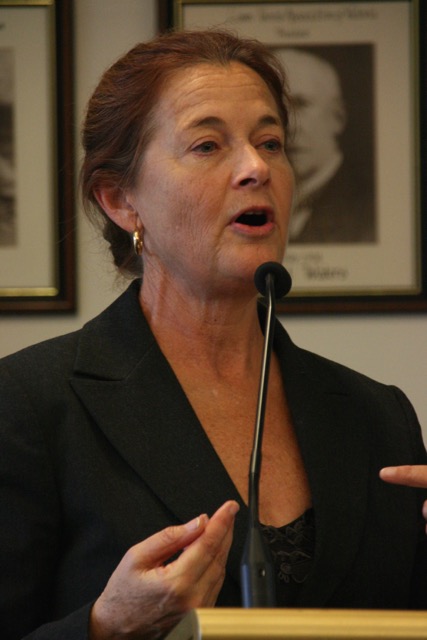|
CEO Heather Pickard keeping the audience in touch as she explains the part SHARC plays in combating problem alcohol and drug use.
|
 |
Chairman of the day was Geoff Wright, himself a regular telephone volunteer on the Family Drug Help line--a program under of SHARC. He introduced Heather Pickard the CEO of that organization. From her address we got an inspiring and wonderful snapshot of SHARC's activities and philosophy in its support to those touched by problems of alcohol and drug use.
One revelation was the simple statistic that about 7-8% of the population is severely impacted, such a high number arises from the flow on effect of the addict's connection with family circles and the disruption to that.
So SHARC or Self Help Addiction Resource Centre is a volunteer based non-profit organization operating to support families of, and addicts, in their own efforts to combat and reclaim their lives from the traumas of drug addiction. Somewhat apparently “flying under the radar”, at least to our member audience, we learnt from Heather that SHARC has a significant presence and proud record in community based rehabilitation work in the aftermath of problem alcohol and drug use.
Commensurate with her role, we learnt that Heather’s background is in nursing with Post Graduate studies in both organizational management and addiction studies. Her professional background over the last 15 years is in managing drug and alcohol programs including the hospital liaison team (now addiction medicine) and the community based Primary Health Care Clinic for drug users.
In 2004 she established a program for nurses experiencing substance disorders and mental health issues (VNHP), including support for their families. Heather became the CEO of this organization in 2006. Heather has had strong links with SHARC over many years, including being a Board Director and consultant. She became the CEO of SHARC in 2009, and believes this opportunity perfectly brings together her lived experience and professional training and experience.
There are several thrusts to the groups efforts.
Family Drug Help (FDH) provides a specialist service to support family members and friends who are concerned about a loved one’s alcohol and other drug use. Family Drug Help aims to strengthen client’s physical and mental health and their ability to cope with a very difficult situation.
The Association of Participating Service Users (APSU) is a Victorian consumer representative body of the Self Help Addiction Resource Centre. APSU believes that people who use drug and alcohol services have a wealth of knowledge and experience. Established meetings, events and lectures provide the means to spread that among the the community especially those being impacted by the addiction.
Most interesting was the housing program run for rehabilitating addicts. With about 70 "recovery focus homes" (of many bedrooms) at its disposal the group offers an experience of normal living for recovering addicts. Some are especially for women. These are not detox units, but rental accommodation involving community living, with rules, and a means to regain confidence under the guidance of professional helpers to lead a self sustainable life.
Heather explained that this was an example of SHARC's place in the "stages of change" which an addict may transgress.
The classic path is from pre-contemplation (friends aware but addict not), contemplation (possible problem), preparation (acknowledgement of problem), action (doing something about it), maintenance (sustaining result of positive action) and lapse/relapse (alas reversion). SHARC focuses its efforts on the maintenance aspect.

